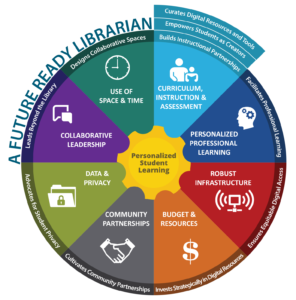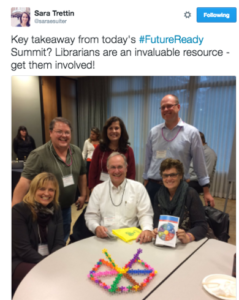Infusing Libraries into Future Ready Schools®
How do libraries enhance the Future Ready Schools® (FRS) effort in school districts across the country? During a FRS national summit held in Seattle, several teacher-librarians were invited to participate alongside administrator teams from California, Idaho, Iowa, Ohio, Oregon, and Washington. They spoke to the roles of the library programs in their school districts, introduced information about Future Ready Librarians (FRL) resources, and joined in conversations about redefining teaching and learning.
During one of the summit’s introductory discussions, table groups used AnswerGarden to brainstorm words describing a FRS school. The word cloud from these contributions could also be used to describe a vibrant school library program that is flexible, purposeful, and enables students to collaborate, think critically, and solve problems.
Expanding Leadership
A common theme throughout the summit was the importance of developing and supporting leaders within schools and across the school district. Eric Sheninger encouraged participants to build a culture where everyone is a leader, including students. During a panel of several district administrators, Mark Ray spoke to the need for ubiquitous leadership by bringing teachers and teacher-librarians to the table to engage in planning and decisionmaking.
Practical ways for teacher-librarians to take the lead include providing professional development, bringing a culture of making into schools through library or mobile makerspaces, and curating quality digital and print resources for students and staff. Teacher-librarians can ensure that the design of the library—one of the biggest learning spaces in the school—facilitates an environment where all students feel welcome and are encouraged to collaborate and create.
Brainstorming Solutions to School Library Challenges
During the “Diving In” stations on the second day of the summit, Mark Ray and Sara Trettin led a shark tank session on FRL. A panel of teacher-librarians fielded challenges from the audience that their districts are trying to solve. Issues included limited library staffing and funding and bringing forward new ideas with library staff who are resisting changes.
Panelist Traci Chun, a teacher-librarian for Skyview High School in Vancouver, Washington, described the library as the one place where all students have access within a school. A library is the hub that serves the entire school; investments in libraries guarantee access for all students. Panelists suggested that schools look for ways to reallocate resources. For example, if less money is being spent on printing, those funds could be distributed to the library instead.
When trying to bring forward change with library staff, Mark Ray encouraged administrators to find several library leaders who are respected by their peers. These library leaders can then work together with administrators to lead change efforts. Inviting them to help rewrite job descriptions and provide professional development for their library colleagues will build trust and create buy-in.
 Defining Future Ready Libraries
Defining Future Ready Libraries
The FRL framework was introduced during the Seattle summit and ignited discussions about how strong school library programs and teacher-librarian leadership play essential roles in FRS schools.
Seeing the group in the photo below choose FRL as a significant learning takeaway from the summit was rewarding. They created a model representing the different wedges of the FRL framework. It was encouraging to know that these leaders would be sharing the framework with others in their districts and continuing these conversations after the summit.
 #FutureReady
#FutureReady
Networking with educational leaders from other areas, discussing successes and challenges, and having time set aside to focus with a team on FRS questions and solutions made the summit a valuable experience. It was invigorating to discover a common vision for teaching and learning among the participants. As districts look for next steps with FRS, find opportunities to bring library leaders to the table and please share ideas using #FutureReady and #FutureReadLibs hashtags.
About the author
Jenny Takeda is one of three district librarians for the Beaverton School District in Oregon and is secretary for the Oregon Association of School Libraries. She can be found on Twitter @JennyTakeda.
